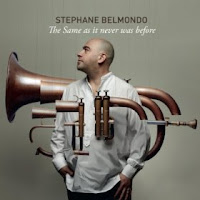The Same As It Never Was Before
(Sunnyside; 2011/Verve France; 2011)
Kirk Lightsey (piano)
(Sunnyside; 2011/Verve France; 2011)
Kirk Lightsey (piano)
Billy Hart (drums)
Sylvain Romano (bass)
Stephane Belmondo's ninth album (either as leader or within a duo), The Same As It Never Was Before, is somewhat a departure, a new chapter and a refreshing return to form for the veteran trumpeter.
His previous efforts have carried him through orchestral settings, contemporary jazz modes, world and soul-jazz infusions (his debut was a magnificent Stevie Wonder tribute). This has allowed him to work with a host of global musicians, including Sylvian Luc, Dee Dee Bridgewater, Yusef Lateef and Milton Nascimento. But now he has settled into a straight ahead and beautifully relaxed mode with this quartet release that should have a wider set of jazz fans taking notice.
All of these experiences, interactions and inspirations of other fellow great musicians is reflected throughout The Same As It Never Was Before. And circling himself around a few well seasoned talents has challenged Belmondo and made this outing a delight to experience. Only Sylvian Romano had worked with Belmondo up to this point.
The soulful bliss of Stevie Wonder is revisited on "You And I" which I almost didn't recognize. It's keeps the core essence of the original but Belmondo's arrangements and quartet's performance gives it a sultry and romantic feel that you immediate fall in wonder with the tune and want to hear again before you move forward with the rest of the session. "Light Upon Rita" opens with a lovely set of chords from Romano and sets a haunting yet investigative approach for the piece. Soon Lightsey, Hart and Belmondo join in and the tune becomes a fiery yet still emotionally structured movement. There are shadows of Woody Shaw, Donald Byrd and the more contemporary Roy Hargrove that emerge in Belmondo's work, and "Light Upon Rita" displays that with strength and beauty.
"Godspeed" is reminiscent of Belmondo's more world-music related work. It's brief (just over 2 minutes), but shows the diversity in Belmondo's writing and how it all fits perfectly on this release. Utilizing his trumpet as well as flute and shells, he crafts a small yet effective interlude (Jon Hassell and Stephan Micus would be proud). "Haunted By Now" is a ballad in which the group is in perfect unity. Lightsey and Belmondo's exchanges together are really heartfelt and feel like they had been kindred spirits.
The Same As It Never Was Before is a monumental piece and an adventurous journey through many ideas Belmondo has worked on in the past. But with this new quartet he has reshaped those ideas into something that surely is the perfect primer for those of you who have yet to experience his music. Well worth seeking out for even the newest of jazz fans.




